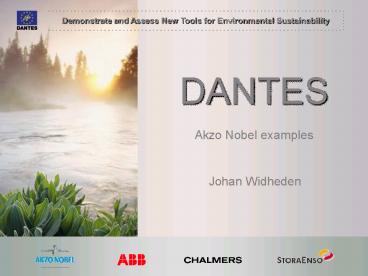Akzo at seminar
1 / 23
Title: Akzo at seminar
1
DANTES
Akzo Nobel examples
Johan Widheden
2
Akzo Nobel
- Multi-national, market driven, technology based
company created in 1969. - Serving customers with healthcare products,
coatings and chemicals - 13 bln euros net sales in 2003
- More than 60 000 employees
- Operates in 80 countries
3
Sustainable Development group
Klas Hallberg Karin SanneMalin
Bogeskär Anna-Lena PalmJohan Widheden
- Life Cycle Assessments
- Environmental Product Declarations
- Eco-efficiency analyses
- Environmental Risk Assessments
- Environmental Impact Assessments
- Transport and energy analyses
Provide different environmental services, such as
4
Registration, Evaluation and Authorisationof
CHemicals
EU New chemicals policy - REACH
- Merging of 2 current systems for new (1980-) and
existing (-1980) chemicals into a new system - Registration of all chemicals gt10 tonne/year in a
central database - Main responsibility for collecting and evaluating
data lies on the producers and importers of
chemicals - Legislation 2 years from now (2007?)
- Progressively installed, completed 2018
5
Environmental Risk Assessment (ERA)
Data evaluation
Effect assessment
Exposure assessment
PNEC Predicted No-Effect Concentration
PEC Predicted Environmental Concentration
RCR lt 1 No risk!
ERA life cycle
Risk Characterisation Ratio
RCR PEC / PNEC
6
ERA results
Scenario RCRwater RCRsoil RCRsed
Production lt1 ltlt1 lt1
Formulation ltlt1 ltlt1 ltlt1
Use Not enough data Not enough data Not enough data
7
(No Transcript)
8
ERA of the use of a flotation agent
Flows of water and contaminants in a mining area
9
(No Transcript)
10
Life Cycle Assessment (LCA) ERA
LCA Including all activities from cradle to
grave Potential environmental impacts from
activities, e.g.Resource useGlobal
warmingWastes
ERA including production, formulation, use and
waste of chemical Risk of impacts on ecosystems
(living organisms) from releases of a chemical
product,
Difficult to include direct effects of substances
on ecosystems and humans
11
(No Transcript)
12
(No Transcript)
13
Ecology and Economy
Sustainable Development
Planet
People
Profit
Eco-efficiency
Eco-efficiency - the ratio of economic creation
to ecological destruction
14
The BASF Eco-Efficiency Analysis method
15
Ecological impact
Energy
Wastes Water emissions Air emissions
Emissions
Land use
Raw materials
Toxicity potential
Risk potential
16
Weighting factors
Relevance weighting
- Societal weighting
- - based on public and expert opinions on the
relative importance of environmental, health
and safety impact categories - - differs between regions and countries
17
Societal weighting factors
18
Costs analysis
- Included costs depend on functional unit
(benefit) - Costs for the end customer sales price
costs during use disposal costs - Varies depending on e.g. the durability of
the product
19
Eco-efficiency evaluation of colorants
Comparing the BASF eco-efficiency method with a
study made by Akzo Nobel
20
Environmental and economic impact
- LCA-based environmental impact
- Consumption of energy
- Consumption of resources
- Land use
- Emissions
- Economic impact
- Environmental costse.g. environmental taxes,
tests, investments on site
- Weighting method
- According to EPS
21
Eco-efficiency results
22
Other findings
- Eco-efficiency analysis not time consuming if
based on collected LCA data - Environmental costs found to be a relatively
large part of the total costs of the studied
colorants - Environmental costs of the surfactants (used in
the colorants) 4,5 6,5 of the sales price
(1 normally reported)
23
(No Transcript)































